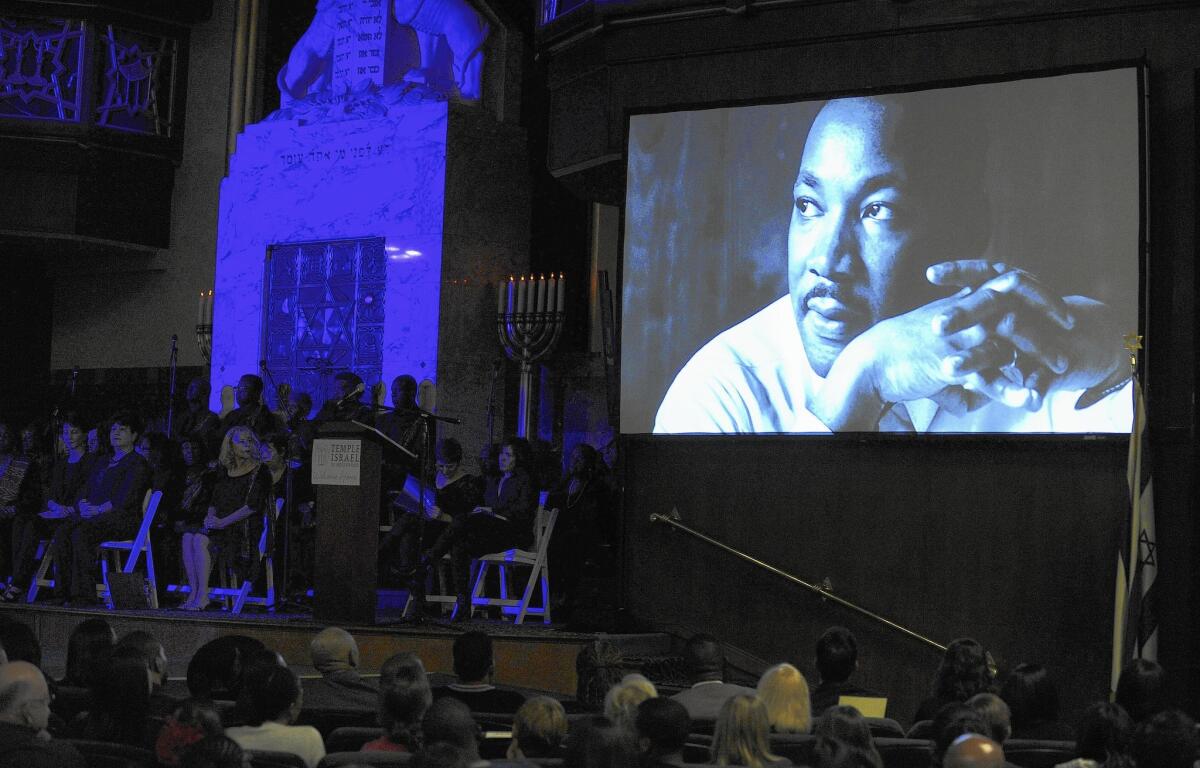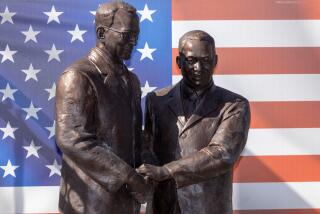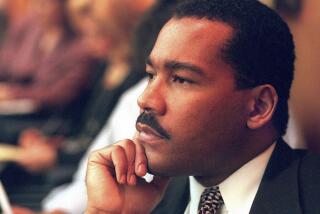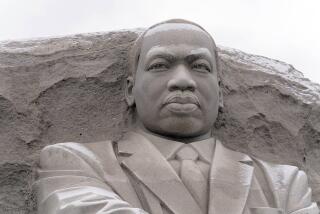Martin Luther King Jr. Day: ‘I hope nothing happens to me,’ King said

Dr. Martin Luther King Jr. was surrounded by heavy security when he arrived in Los Angeles on Feb. 24, 1965, to give a series of speeches pushing for voting rights legislation.
It was a pivotal moment in the civil rights movement, coming three days after the assassination of Malcolm X in New York and a month before the historic marches in Selma, Ala., where police violence against peaceful protesters would ultimately galvanize the country.
“I hope nothing happens to me,” King told a Times reporter upon his arrival in L.A. But should he be killed, he said, there should be no violent retaliation.
One of the venues where King was to speak that week was Temple Israel of Hollywood.
On the eve of the federal holiday honoring King, the synagogue on Sunday evening held a celebration to remember his visit 50 years ago and the sermon he delivered to a full house on Feb. 26, 1965.
Anticipation and anxiety ran high that night, said Ruth Wolpe Rose, 81, who was among those in the audience. The temple had waited years to host King. A 1963 visit was canceled after President Kennedy was assassinated. It was King’s first trip after winning the Nobel Peace Prize.
Rose, then a 31-year-old schoolteacher, arrived an hour early with her husband to secure a seat. Inside the temple, security guarded the doors and checked bags for firearms or explosives. Earlier that day, a Glendale man connected with a neo-Nazi group had stolen 1,400 pounds of dynamite as part of a plot to kill the civil rights leader.
Rabbi Max Nussbaum, who had fled Nazi Germany, introduced King as “the man who has given the history of our generation a forward thrust, a sense of direction, an encounter with destiny.”
King, his voice booming, delivered a powerful 40-minute sermon that tied the civil rights struggles of African Americans with the inequalities the children of Israel suffered in Egypt. He asked the congregation to help push society forward past “stagnant complacency and deadening pacifity.”
“We’ve been in the mountain of racial injustice long enough,” King said. “And now it is time for us to move on to that great and noble realm of justice and brotherhood.”
Rose recalled how “comfortable” King appeared at the lectern, even with the heightened security.
“His posture was erect,” she said. “He was not hiding from anyone.”
On Sunday, Rose and others honored King with a multicultural musical rendition of his speech at the temple. Religious leaders also took part in the 90-minute celebration. TV talk show host Tavis Smiley, who recently wrote a book about King, was the keynote speaker.
The evening opened with the crowd clapping as a band of choirs — the Leimert Park Choir, the Life Choir and the Temple Israel choir — marched down the aisles toward the sanctuary stage, singing the civil rights hymn “Ain’t Gonna Let Nobody Turn Me Around.”
On large screens flanking the stage were photos from the civil rights movement as well as of latter-day demonstrations. “Trayvon is my neighbor,” read a sign carried by one demonstrator, joined by familiar images of protests in Ferguson, Mo., and New York.
The interplay of past and present in the ongoing struggle for racial and economic justice threaded through the night.
Los Angeles Mayor Eric Garcetti called King’s speech “one of the most powerful speeches he ever gave” and underscored the role L.A. played in the civil rights movement.
“He spoke about so many things that today are as powerful as they were then,” Garcetti said.
Calling it a “difficult time” for the world, John Rosove, the senior rabbi at Temple Israel of Hollywood, said: “We need the spirit of Dr. King to permeate our hearts, minds and souls — especially today, when injustice, alienation and violence pollute our society.”
Organizers said King’s words are just as relevant now as they were 50 years ago, noting the recent deaths of Trayvon Martin, Eric Garner and Ezell Ford.
Though King practiced a doctrine of nonviolence, he said that some causes were worth dying for.
“One has to conquer the fear of death if he is going to do anything constructive in life and take a stand against evil,” King told The Times during his visit to LA. “I am prepared to face anything that comes.”
More to Read
Start your day right
Sign up for Essential California for news, features and recommendations from the L.A. Times and beyond in your inbox six days a week.
You may occasionally receive promotional content from the Los Angeles Times.








